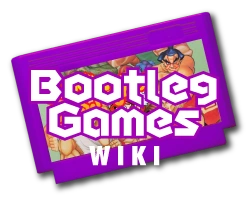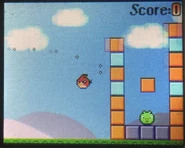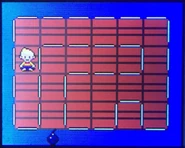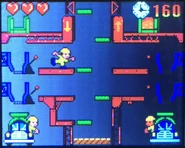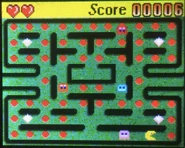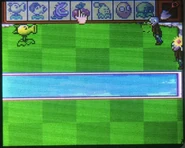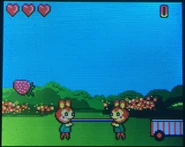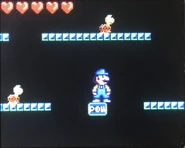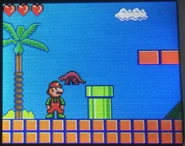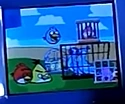
The Terminator 1.8, one of the earliest known systems.
"1.8" Handheld Games is a term dubbed to a series of portable game consoles with distinct original games inside, originating in 2012. The handhelds feature many bootleg ports of various games, ranging from NES titles to Android/iOS and Windows games. They are notable for their small, 1.8" screen (thus the term 1.8) and their bizarre game library.
Overview[]
The original 2012 handhelds had a typical range of around 20 to 32 games. They had 16-bit graphics and somewhat melodic-sounding music. For unknown reasons, the capabilities of the handhelds were lowered as time went on, possibly to reduce cost. Post-2013 releases have exaggerated game counts; no direct repeats, but many hacks and near-identical games. The graphics remain about the same, but the sound is a lot harsher and of lower quality. Additionally, games which had decorative title screens were often changed to plain text in later revisions. Some games, such as Pacman, appear far less frequently in post-2013 models.
The 1.8" handhelds are the successor to a series of GameKing clones, which began production in the mid-to-late 2000s. Many of the GameKing clone games also appear on the 1.8" hardware as updated ports; given full color and additional features. As of now, it is still unknown who developed the titles contained on these units; though it is possible they were produced by Timetop, the original creators of the (uncloned) GameKing handheld.
Hardware information[]
The handhelds output at a 160x128 resolution. While some earlier models use proper ROM chips, the later models store game code and data in a SPI flash IC. Examination of the contents shows that the processor in them is 65C02 based. The code contain does not seem to contain NES PPU accesses or anything else indicative of NES based hardware. Both the ROM and SPI versions have preliminary support in the MAME emulator.
Games[]
The games found on these handhelds are mostly clones or ports of other game titles. Originally these were prominently advertised, but later many were altered to not be as copyright infringing. Due to the large amount of titles, some games can be difficult to differentiate; with many having near-identical names (particularly using words like "Balls", "Shoot", or "Receive") or reoccurring concepts (such as frogs or bows and arrows). However - despite numerous duplicate variants also existing - the majority of titles are actually unique games from each other.
The below list features the following notation: An [a] indicates a game that appeared on "original" 2012 models (i.e. the smaller game count consoles with melodic sound). A [b] indicates a game that is also on the later "upscaled" consoles (see below).
- 2012[a] - Enhanced port of the GameKing game 2004, which appeared on GameKing clones as Star War. While a clone of 1943 in its original form, the 1.8" version is given a space theme. Alternately titled Raiden[b].
- There is a graphic hack of the game titled Star Wars[b]; despite the name, it features a hand-drawn look not reflective of the Star Wars series. It was later renamed to Star Battle.
- 2048 - Port of the original game.
- Aflame Plant - Launch living vegetables at oncoming enemies using a slingshot.
- Air Intercept[b] - Using a standstill cannon, the player must aim cannonballs at hovering planes.
- Air-Raid Warden[b] - Shoot at the planes and helicopters flying above; the player's bullets fly at diagonal angles.
- Another version, titled Tank Attack, only allows shots to be fired straight upward. A variant titled Tank Attack II retains the diagonal movement of Air-Raid Warden. The respective games are alternately titled Aerial Defence[b] and Aerial Defence II[b].
- Air War[b] - A shooting game that mixes elements from Space Invaders and Galaxian. Alternately titled Air Invade.
- Airdrop[b] - Collect the vegetables thrown by the plane while avoiding bombs.
- Airfight[b] - Port of Sky Destroyer, with all war connections removed.
- Anger Birds[a] - Port of Angry Birds. The physics are more fluent compared to many contemporary Angry Birds bootlegs (e.g. the Sega Genesis port), though are still somewhat stiff. The game features 10 levels.
- On the Globex PGP-100 console, Anger Birds is labeled as Angry Birds Rio. The "Rio" version features the same exact levels, but replaces the pigs with birds trapped in cages.
- One alternate version retains the Angry Birds graphics, but changes the title screen artwork to not have a logo. This variant is referred to as "Angry Pigs" in the game menu; not to be confused with the different game below.
- Later systems reskin the game as Angry Chicken[b]. The game is identical other than some swapped bird colors. There is also an Angry Chicken II[b]; which is actually the Angry Birds Rio version with the additional changes from Angry Chicken I.
- The rather common name change from "Angry" to "Anger" almost never applies on packaging and actual units. Many systems are actually branded as Angry Birds on the top of the plastic, but it is always Anger in the game list.
- Angry Pigs[b] - The player controls an Angry Birds pig, and must jump across platforms to gather a trail of pigs behind him (similar to Where to Go). The pig quickly outscrolls the screen, making it very difficult to play. It is unrelated to the "Angry Pigs" variant of the Anger Birds game.
- There is a hacked version titled Three Rabbits[b], where the player controls Bugs Bunny; there are no further characters to gather, with two rabbits already following Bugs from the start.
- A version called Cat and Mouse III[b] is based on Three Rabbits, but features Tom with Jerry trailing behind him (and no third character); the first jump appears to literally be impossible to pass. This variant was further hacked into Two Mouses[b]. These variants are possibly exclusive to the later upscaled consoles.
- Yet another version called The Bird Home[b] follows the same gameplay rules as Angry Pigs, but uses Angry Birds (referred to as "Cocks" in-game) and features different levels. If the player dies, the sprite reverts back to the pig for a split-second.
- Apache Overkill - A horizontally-scrolling shooter. Alternately titled Copter Mission.
- Apples Jack - Port of Mighty Bomb Jack; the enemies are changed to the Ghosts from Pac-Man.
- Archer Master[b] - The player controls a singular dart, and must collect as many points as possible before hitting a distant target.
- Baggage Claim - Put the bags through the correctly-colored chutes.
- Ballon War[b] - a side-scrolling shooter where a girl flies on balloons, shooting animals such as blue rabbits and farting pigs.
- Bastion - Shoot at incoming soldiers.
- Beat Pig[a][b] - Whack-a-Mole game with Angry Birds pigs.
- Strangely, when the game was added to later systems, the pigs were redrawn, given Adolf Hitler-staches and WWII helmets. A reskin of this version changes the pigs from green to pink. Another version changes the pigs to frogs (strangely turning the pigs' ears into frog eyes), but is still titled Beat Pig.
- In addition to this, there is another reskin called Hammer Chicken[b].
- Basketball - A basketball game with a moving net.
- Beer Waitress - Port of Tapper.
- Bees Attacking - Port of Go Away Fly!, a Flash game based on the Dooly the Little Dinosaur series; graphics are retained from the original. Alternately titled Defeat Fly[b].
- Beware Cross[b] - Port of Frogger; only one frog needs to get across, as opposed to five in the original.
- Bird Week - Port of the original game.
- Birds Bomb[b] - Some sort of puzzle game; uses characters from the mobile game Birzzle.
- Blobs[b] - Plays similarly to a peg game, but it is not in a triangular formation; it features frogs on a rectangle of lilypads.
- Block Block - Place the tiles in so they fit into the area below. Alternately titled Compound Picture[b].
- Bloxorz[a][b] - Port of the original game.
- Boldly Egg[b] - Port of The Amazing Dare-Dozen; the player must guide the egg to jump into the above baskets. There is an extensive graphic hack titled Frog Jump[b].
- Bomb Sweeper - Port of the Game & Watch game. This title stars Lucas from Mother 3. Later hacked to create Bomb Chicken, Box Sweeper, and Chicken Maze.
- Box[a] - Port of Soukoban. The later upscaled version is titled Push Boxes[b].
- Bravery Bird[b] - The player controls a ball resembling a bear's head, and must collect all of the stars without touching the spikes.
- Contrary to the name, there are no birds. The later upscaled version uses a yellow Angry Bird, however, which may suggest there is an earlier 1.8" version with this sprite as well.
- Brick[b] - Shoot as many bricks as possible within the time limit.
- Bright Stone[b] - Clear all tiles within the allocated steps.
- Car Parking[b] - Drag obstacles out of the way so the car can escape through the exit. Alternately titled Car Park.
- Cat and Mouse - Port of Tom and Jerry: Food Fight. The later upscaled version is called Cat and Mouse II[b] (while labeling the below title as the first game).
- Cat and Mouse II - Tom is chasing Jerry in a circle; the player guides Jerry to jump over Tom to avoid being caught. The death sound is sampled from Pac-Man. The later upscaled version is called Cat and Mouse[b] (while labeling the above title as the second game).
- Catch Chicken[b] - Trap the chicken in a smaller pen without crushing it.
- Cayman Washing - A pipe connector game starring Swampy from Where's My Water.
- There is an alternate version called Give Me Water[b], featuring different level layouts and a goldfish instead of Swampy.
- Chain Reaction[b] - The player sets a chain reaction to wipe out all of the water puddles.
- Clear Map[b] - Clone of Lights Out.
- Colony War[b] - Gameplay cannot be determined.
- Color Balls[a][b] - Puzzle game with the same rules as SameGame or Collapse!.
- Connect Four[b] - The classic board game. The later upscaled version adds a meadow in the background.
- Couple Plants[a][b] - A mahjong solitaire game with Plants vs Zombies characters. Later hacked to use generic plant designs.
- There are several graphic hacks of the game, including Couple Animals[b], Fun Pair, and Link Link. Couple Animals uses tiles from Zoo Keeper (as well as Angry Birds).
- The upscaled version of Link Link is titled Couple Everyday[b].
- There are several graphic hacks of the game, including Couple Animals[b], Fun Pair, and Link Link. Couple Animals uses tiles from Zoo Keeper (as well as Angry Birds).
- Crocodile Feeding - The player controls a caveman, and must strategically aim to throw meat into crocodiles' mouths. Alternately titled Feed Cayman[b].
- CS-Fire[b] - Based on Counter Strike, but plays more like Contra and uses assets from Metal Slug.
- Cute Bunny - A clone of Puyo Puyo that uses animal tiles as the playing pieces.
- Dancer Trace[b] - Psy, of Gangman Style fame, must "trace" the arrows in the order they appear. The game is likely supposed to resemble Dance Dance Revolution, but the notes do not go to a beat.
- A nearly identical clone called Crazy Dancer[b] changes the way the arrows appear on-screen.
- Deal or No Deal - Recreation of the TV game show; possibly adapted from the ticket redemption arcade game.
- Demon Warrior[b] - Based on SonSon in gameplay mechanics, but is very different in appearance.
- Destory Bricks[b] - Based on Tetris Attack/Panel De Pon.
- Destroy Hubble[b] - Clone of Pang.
- Difference[b] - Launch the plunger onto the tile that is different than the others. There is an altered version titled Difference II[b] where the tiles fall rather than staying still.
- Dinosaur War - Protect the baby dinosaur from oncoming enemy dinosaurs by breathing fire onto them. Alternately titled plural as Dinosaurs War[b].
- Disappear Birds[b] - Put the bird in the correct spot so it can destroy the others. Uses characters from Birzzle.
- Disappear Boxes[b] - Move the boxes in the correct order so they can be destroyed.
- Domain War[b] - Seemingly holding some sort of racist undertones, the player attacks intruding Egyptians and elephants to prevent them from reaching the border.
- Donkey Kong[b] - A port of Donkey Kong 3 with the player controlling Luigi. Donkey Kong's face appears to be created from a mirrored image of a side angle, resulting in a rather strange look.
- Duck - Port of the original game. The game is easier than the original counterpart.
- Eatting Balls[b] - The player controls a red ball that clings to walls when moved; the red ball must be guided to "eat" all of the yellow balls. Alternately titled Orbs.
- There is a graphic hack titled Eating Worms[b], which reuses sprites from Receive Apples and the earlier versions of NS-Tower/Shaft.
- Elevator Action[b] - Port of the original game.
- Elude Balls[b] - Avoid being hit by the bouncing balls.
- Falcon Man - The player controls an archer who shoots down falcons.
- Fishing - Based on a popular genre of fishing arcade games in China, more commonly known overseas as Harpoon Lagoon. Fittingly given the game's setting, it plays the underwater theme from Super Mario Bros.
- Flip the Squirrel - The player must avoid touching the wooden planks, which move up and down from the top of the screen; the squirrel can roll into a ball to dodge the planks. Alternately titled Squirrel Run[b]. There is a graphic hack titled Monkey Run[b].
- Flying Bullet[b] - A game based off the Ricochet Kills series of games.
- There is an extensive hack called Fly Bullet II[b], which changes the enemies to walking snails (whereas all enemies are standstill in Flying Bullet I).
- Flying Disk[b] - Loosely based on the clay pigeons mode in Duck Hunt.
- Flying Higher[b] - The player must guide a boy, who jumps automatically, up the screen by jumping onto clouds; the clouds disappear after being landed on.
- Football - A soccer goalkeeping game. Alternately titled Football Game[b].
- Frog Jump II[b] - Swap the locations of the frogs to be on the opposite ends of their starting point.
- Front Line Spy[a] - Shooting game based on the PC game CrossFire. Alternately titled The Agent[b].
- Fruit Knight[a][b] - Based on Fruit Ninja, but features a visible ninja who is locked on a background plane (so there is no complete "swipe" movement). The game is also aesthetically very different.
- Fruit Machine[b] - A slot machine game. Oddly, the 1.8" version features five rows of slots, while the later upscaled version only has three rows.
- Fruit Skewer[b] - Skewer lines of the same three kind of fruit to make them disappear.
- The Ftpunk[b] - Uses similar rules to Eatting Balls, but the player controls a rabbit who must mine diamonds that he clings onto. There is a graphics variant titled Duck Thief[b].
- Gang Tie III - An Iron Man-themed, side-scrolling shooting game similar to Gradius.
- On some systems, the player controls a character resembling Captain America rather than Iron Man. It is possible the game is changed often to reflect the "blockbuster superhero film" of the current time. The more recent systems replace Iron Man with a more generic superhero.
- Gemstone - A Zuma-inspired game (even sharing the music from their port of said game) where you launch colored balls from above in order to clear the line of gems. Alternately called Karo.
- Gravity Boy[b] - The player is chased by a missile, and must jump across platforms facing up and down - the latter positioning the player upside down - to avoid falling into pits.
- There is an additional upscaled version titled Climbing Boy[b], which has the platforms facing left and right rather than up and down.
- Greedy Boies[b] - Destroy the balls by colliding them into each other, then feed the last ball to the creature hovering at the top of the playfield.
- Greedy Jarry[b] - Jerry (from Tom & Jerry) must collect all of the items scattered around the level; he is constantly bouncing, however, and will never stay still.
- Greedy Snake[b] - A snake game.
- Guess Plants - A Mastermind game with Plants vs Zombies symbols. Later hacked to use generic plant designs.
- Honey Mary - Port of the Game & Watch game Mario's Cement Factory, with Mario pouring honey rather than cement.
- Horse Jump - The player controls two split-screen playfields of girls riding on horses, and must leap over obstacles on both screens simultaneously. The later upscaled version is titled No One Die[b], which changes the horses to wild cats.
- Hunger Frog[b] - An attempt at a Cut The Rope-style game. The player controls a bow and arrow, and must pop the balloons when they are hovering over the prince frog below, so he can eat the candies attached to them. Some later versions redraw the frog graphics.
- Hurdle[b] - Clone of a Track & Field event.
- Most companies inevitably clone all of the events from Track & Field, but surprisingly, this seems to be the only one of its kind in the "1.8" game set.
- Ice and Fire[b] - A platformer based on the Fireboy and Watergirl series of Flash games. The player can only choose to be one character or the other; unlike the original games, in which both are controlled simultaneously.
- Impossible[b] - Port of The Impossible Game.
- Jumping Boy[b] - The player must guide a character resembling Scott Pilgrim across the platforms; this is done by holding down the A button, which springs up the ground and increases its height.
- Jumping Frog[b] - Guide the prince frog to hop on the lilypads in the correct order. Some later versions redraw the frog graphics.
- This game also has a reskin called Mouse Jumping[b] that uses the graphics from Cat and Mouse.
- Another game titled Cross River[b] is effectively a much easier version of Jumping Frog, with the needed lilypad jumps highlighted in numerical order.
- Kill Zombies[b] - A samurai must shoot incoming monsters without letting them reach the bottom of the screen. Note that unlike other "zombie" titles, it is unrelated to Plants vs Zombies.
- King Boxing[a] - Enhanced port of the GameKing clone game of the same name; it is a one-on-one fighting game. The original release seems to feature Robert Garcia and Joe Higashi (albeit both of them being heavily edited) from the King of Fighters series.
- Later systems reskin this game as Matchstick Man[b], which replaces the King of Fighters characters with generic stickmen. The original King Boxing version seems to no longer be featured.
- The GameKing clone consoles feature another variant called Trans, which uses Transformers characters; it is unknown if this version has a 1.8" equivalent.
- Local Tyrant - Some sort of virtual board game; the title screen and all in-game text is written in Chinese. One of the two player characters is Toad from the Super Mario Bros. series, using his sprites from Mario Party Advance (including his car); the other player is seemingly generic.
- Lose Picture[a] - Find the other missing half of the picture.
- Lucky Box[b] - A Russian Roulette-like "game" where the player controls one of four animals, and must collect boxes while hoping their animal doesn't don't get a bomb.
- A game titled Free Me features roughly the same concept, but there are no computer opponents; meaning the player literally opens all boxes until they inevitably die. There are several minor hacks of Free Me, including Find Bombs[b], Memory Chest and Sweep Mine[b]; the latter done seemingly to label it as a pseudo-Minesweeper game.
- The upscaled version of Memory Chest is titled Bomb Sweeper[b]; not to be confused for the Game & Watch port.
- A game titled Free Me features roughly the same concept, but there are no computer opponents; meaning the player literally opens all boxes until they inevitably die. There are several minor hacks of Free Me, including Find Bombs[b], Memory Chest and Sweep Mine[b]; the latter done seemingly to label it as a pseudo-Minesweeper game.
- Magic Ball[a][b] - A "find the ball in a cup" game.
- Magic Pic[b] - Match the picture on the right with the example on the left.
- Magic Stone[b] - Port of Columns.
- Mars Mission[a][b] - Another shooting game based on Space Invaders; enemies must be shot ten times before being destroyed.
- Me Want Bamboo - Port of the mobile game of the same name. It is an auto-scrolling platformer where a panda must fart to hop over broken parts of a bridge. The amount of farts are limited, but more can be gained by eating bamboo sticks. Later consoles rename this game Pi Wang[b].
- A hack called Running Cool removes the bamboo and fart mechanics from the game. This actually makes it impossible to play, as many of the gaps cannot be cleared without farting. Alternately titled Running Everyday[b].
- Melons Bowling[b] - Launch melons from the conveyor belt into the oncoming Zombies.
- Melons vs Zombies[a] - Whack-a-Mole game with Plants vs Zombies characters. Alternately titled Shoot Zombies[b].
- Mirror Game[b] - The player chooses the symbol that would come next in sequential order, based on a mirrored layout of six tiles. The 1.8" version features a clown, while the upscaled version features a dog.
- Missing Animal[b] - Memorize the four cards shown and choose which one is missing.
- Monkey Running[b] - The player controls a monkey, and must jump between two poles to collect coins and avoid obstacles. Alternately titled Monkey Climbing.
- Montezuma[a][b] - Port of The Treasures of Montezuma; it is a "match-3" puzzle game. This title is particularly infamous for using the theme to the 1980s sitcom "Cheers" as its in-game music. There is a slight graphic hack of the game titled Montepuzzle.
- There are several basic hacks of this game which change several game rules or graphics; examples include Montezuma II[b]/Gem Puzzle (different piece-turning mechanic), Eliminate (features animals instead of gems), and Eliminate II (combining both prior versions).
- The later upscaled versions of the latter two are titled Everyday Eliminate[b] and Everyday Eliminate II[b].
- On the lefthand side of the screen, there is an enemy snakehead from Mega Man 3. This was likely intended to be a frog, implying a connection to the unrelated Zuma series. The Montepuzzle hack replaces the snakehead with Gargantua Blargg from Yoshi's Island.
- There are several basic hacks of this game which change several game rules or graphics; examples include Montezuma II[b]/Gem Puzzle (different piece-turning mechanic), Eliminate (features animals instead of gems), and Eliminate II (combining both prior versions).
- Mountain Biking[b] - an auto-scrolling game where the player, while riding a bicycle, must jump to avoid obstacles. There is an alternate version titled Bamba[b] where the player rides a unicycle.
- There is also a later upscaled version titled Scooter[b]; contrary to the name, the player rides a skateboard.
- Moving Balls[b] - Basic shooting game with an on-screen crosshair. There is a graphics hack called Shoot Hexapod[b].
- Mushroom Array[b] - Match the mushrooms' position with the preview image, similar to a slide puzzle. There is a graphic variant titled Cartoon Array[b].
- Some later upscaled releases erroneously swap the game titles (so Cartoon Array uses the mushroom sprites and vice-versa).
- Mushroom Ball[b] - Guide the ball to collect the mushrooms.
- Mutative Maze[b] - You control a blob creature, who can only pass through doorways of his color. To get through the maze, you must "mutate" into another color by passing over it.
- NS-Shaft[a][b] / NS-Tower[a][b] - Ports of the original games.
- Later systems remove the generic protagonist and replace him with Risk-King.
- These games received numerous later reskins, including Gang Nam Run[b], Jumping Panda[b], and Tolower[b]/Toupper[b].
- Number Taxis[b] - A slide puzzle game. Alternately titled just Taxis.
- On All Sides[b] - The player is shot at from tanks facing all directions, and must carefully shoot away the other tanks' bullets. If the player shoots too many bullets, they ricochet and destroy the player's own tank. The later upscaled version is titled Enemy On All Sides[b].
- There is a hacked version titled Dancer Attack[b], which replaces the tank with a moving Psy and bullets with Dance Dance Revolution-like arrows. All sprites are reused from Dancer Trace/Crazy Dancer.
- OTM Pick Fruit[b] - The player controls Ultraman, and must collect fruit thrown by a dragon. Failing to collect fruit will make ground tiles disappear, which will kill the player if they fall into the hole.
- Outline[b] - Line up the bottom holes so the corresponding shapes can fit through.
- Pacman[a] - Based on the original game, but it plays slower and changes the Power Pellet's function (it now freezes the ghosts momentarily instead of allowing them to be eaten).
- Parachute - Port of the Game & Watch game. Alternately titled Normandy Disembark[b].
- Plants vs Zombies[a] - Port of the original game.
- One alternate version retains the Plants vs Zombies graphics, but changes the title screen artwork to not have a logo. This variant is referred to as "Shooting Zombies" in the game menu.
- Later systems reskin this game as Animals vs Zombies, which in itself was later retitled Angry Animals. This hack retains Zombies, but replaces plants with various animals (including several from other games, like Angry Birds and Where's My Water).
- Some later releases title the game Angry Plants[b], but retain the graphics from the original Plants vs Zombies port. The later upscaled consoles also retain the title screen, but 1.8" releases under this name do not.
- Porter[b] - Based on the Game & Watch Mario Bros.; Luigi is not on the other side of the screen, and is replaced with bumpers that move the crates automatically.
- Rabbit vs Icecream - Port of the Flash game Mushbits 2. The player controls two rabbits, one pink and one blue; the rabbits can only walk on tiles of their respective color, and will change the tiles to the opposite color as they walk. The player must strategically use these rules to guide both rabbits to eat their ice cream. Alternately titled Rabbit Eat Ice Cream[b].
- Racing Boat[b] - The player controls a red Sonic on top of a whale, and must win the race while collecting coins and avoiding obstacles (including other racers).
- Racing Car[b] - A top-down racing game. There are numerous hacked versions with different vehicles, such as Kartrider[b] and Racing Motor[b].
- Receive Apples[a][b] - Catch the apples without letting them fall. A game from Bandai Tamagotchi Plus Color.
- Receive Eggs[b] - Port of the Game & Watch game Egg.
- Receive Fruit[b] - Port of the Game & Watch game Fire. Mario and Luigi are replaced with two rabbits that resemble Bunnie, a villager in Animal Crossing.
- Receive Gift[b] - Based off of Nice Code's Mad Xmas.
- Resource War[b] - Run over all of the question mark tiles (turning them into "OK" tiles) while avoiding incoming bullets.
- Risk-King[a][b] - Enhanced port of the GameKing clone game of the same name, which itself is a hack of the original GameKing title Adventure Legend Carlo. It is a clone of Super Mario Bros.; the levels and presentation are seemingly based on Super Mario Land. Some versions have the player control Mario himself, while others replace him with a rabbit (as is also the case with the GameKing clone consoles).
- There is also a reskin called Gangnam Style, in which the player controls Psy and avoids characters from various mobile games, while a terribly off-sync version of Gangnam Style plays in the background.
- Risker[a][b] - Port of the Mario Bros. arcade game; it runs extremely choppy for unclear reasons. The game scrolls to fit the entire map of the original. As with Risk-King, some versions feature Mario as the player while others feature a rabbit.
- On some systems, Mario's colors reflect those seen in the arcade game, where he has a blue hat and overalls. Other consoles feature a version where Mario wears red clothes instead.
- There is a hack called Bear vs Bald[b], which heavily speeds up the game in addition to altering the sprites.
- On the GameKing clone consoles, Risker is presented as an entirely different game; effectively a side-scrolling version of NS-Tower/NS-Shaft. Despite this, it uses either Mario or the rabbit as the player character.
- Robot Roundup[b] - Lay out arrows on the playfield to guide the robot to the end goal. There is a graphic variant called Rabbit Roundup[b].
- Rocket Man[b] - The player controls Astro Boy, and must avoid various obstacles coming their way, similar to Flappy Bird. Reuses the background (and possibly game engine) from Apache Overkill.
- In another variation, Flying Broom[b], the player controls Harry Potter on his broom.
- Running Boy - An auto-runner game where the player must turn to walk on sideways walls, while avoiding obstacles and gathering other kids that run behind him (similar to Where to Go). The later upscaled version is titled Running Friends[b].
- There is another version of the game called Cool Boy, in which there are not other kids to collect. The later upscaled version is titled Cool Boy II[b].
- In upscaled releases, the version just titled Cool Boy[b] (rather than Cool Boy II) is actually a hack that removes obstacles. The upscaled consoles also feature an obstacle-removing hack of Running Boy called Running Men[b].
- The Same[a] - Card matching game with Plants vs Zombies characters.
- This title has many graphic hacks, such as Card Match, Poker Game, Same Animals, and Same Birds[b]. One version of Same Animals does not actually use animals.
- Save Bears[b] - Based on the Game & Watch game Fire, with a unique appearance (and differently programmed than Receive Fruit).
- One of the three bears, in addition to the ones from Bear vs Bald and Me Want Bamboo, resembles the main character in the Chinese cartoon Boonie Bears.
- Sea Wolf[a][b] - Based on the arcade game, but plays more similarly to Depthcharge. The player controls a ship and must shoot at the attacking submarines below.
- There is a minor hack of the game titled Aeronaval War[b], in which the player must both shoot enemies above and below their ship.
- Seicross[b] - Port of the original game.
- Seriation[b] - Memorize the card pattern and recreate it from memory; uses characters from Birzzle.
- Settle Puzzle[b] - Move the duck so the floor pattern is only crossed over once at each angle.
- Shoot Balls[a][b] - Hit the heart balloons while avoiding the skull balloons. A game from Bandai Tamagotchi Plus Color. Alternately titled Balloon Arrows.
- Shoot Birds[b] - Hunt birds with a crosshair. There is a graphic variant titled Sky War[b], in which the player shoots down men in planes.
- Shoot Fruit[b] - The player shoots fruit with a bow and arrow, while avoiding bombs; possibly loosely based on Fruit Ninja.
- Shoot Monster[b] - Another basic balloon-shooting game, but you shoot down Bloopers from Super Mario Bros.
- Shoot Penguins[b] - Port of the Flash game Penguin Arcade.
- Slalom - A slalom game starring Luigi, complete with voice samples.
- Snow Ball - A game simulating a snowball fight.
- Stamp Glass - The player must quickly poke the glass with their finger (by repeatedly slamming the A button) until it shatters.
- Stone[a] - Puzzle game similar to Columns, but with two gems on one row instead of three. The later upscaled version is titled Color Stone[b] (not to be confused with the 1.8" Zuma variant).
- Sudoku[a][b] - A Sudoku game.
- Tank War[b] - Enhanced port of the GameKing game PocketTank, which appeared on GameKing clones as just Tank. It is a top-down shooting game similar to Jackal.
- Target Practice[a] - Shoot the balloons without letting any fly away. Later systems rename this game Toxophily[b].
- Temple Run - Port of the mobile game; features rather choppy scrolling, but is otherwise fairly accurate to the original.
- Tetris[a][b] - Port of the original, based on a Brick Game version. The later upscaled version adds artwork in the bottom-right corner.
- The same "Brick Game" coding, like the handhelds it was based off of, was reused for various other titles, including Cubix[b] (a clone of Quarth) and Greedy Snake II (a Snake game).
- Tic Tac Toe[a][b] - Based on an unknown table game unrelated to Tic Tac Toe.
- Tiny Thief - Port of the mobile game of the same name. Alternately titled Little Thief[b].
- Tom Cat - A port of the mobile game Talking Tom. The game features prerendered graphics downscaled from the original app; Ben also appears, who can sneak through the window and scare Tom.
- Tower Defend[a] - Port of Flash Element TD.
- Twin Shot[b] - Port of the Adobe Flash game of the same name where you must kill all the enemies on a board.
- Walkway - Hop over the people walking in front of you to pass them. Alternately titled Death Kiss[b].
- The Wall[a][b] - Enhanced port of the GameKing clone game of the same name, which itself is based on Breakout/Arkanoid.
- Original versions have a total of 100 levels - on later systems, the last 50 are scrapped.
- Wall Ball[b] - based on the coding of The Wall, but there are no actual bricks to hit; having the player merely hit the empty wall.
- Wars of Islands[b] - A vertically-scrolling shooter.
- Where to Go - Based on the Chinese TV series Where Are We Going, Dad?. The game is an endless runner where the player controls a dad rescuing his children (who will trail behind him when gathered), while running to a flagpole at the end of the screen.
- One revision of the game has the title screen written in Chinese, and features the TV show's theme song as sampled music. The more common revision has the title written in English, and has an 8-bit rendition of the theme instead.
- The later upscaled version is titled Where Are We Going[b]. Oddly in this version, the kids are replaced with modified sprites from Scott Pilgrim vs. the World: The Game (including Scott Pilgrim himself).
- Wing Dream[b] - You control a pig, and must get to the other side of the screen; there is a huge gap blocking the way, with balloon-weilding monkeys flying in front. You must charge into the balloons, without hitting the monkeys' bodies, with enough force to cross the gap.
- A very similar 16-bit game was produced by Nice Code Software titled Flying Dream. It is unknown if the 1.8" game is a "port" of the Nice Code title, or if both are cloned from another unknown game.
- Wisdom Heart[b] - Port of Puzznic.
- Wolf vs Rabbit[b] - The player must guide the rabbit into the exit hole while avoiding the wolf. For every one tile the rabbit can walk, the wolf can walk two; however, there are many ways to temporarily trap the wolf. There is a graphic hack titled Catching.
- There is an additional upscaled variant called Tom vs Jarry[b], which replace the wolf and rabbit with Tom and Jerry.
- Zuma[a] - Port of the original game. Alternately titled Color Stone.
- Various Circus Charlie games - Ports of various Circus Charlie levels, separated into different games. They include Circus Charlie[b] (level 1), Monkey Jump[b] (level 2), Grounder[b] (level 3), and Jumping Over[b] (level 4). Each version only grants the player one life. In the first game, Circus Charlie rides a dog instead of a lion.
- Various educational games - a series of quick reaction games, played solely using the d-pad; these appear to be based on a Chinese mobile game titled Let It Burn!! Right Brain Games (燃烧吧!!右脑的运动会). Titles include Color Impress[b] (a "greater or less" game), Cubic Tower[b] (count the amount of cubes), Figure[b] (shapes), Flash Memory[b] (numbers), Quick Master[b] (math equations), and Rapid Reaction[b] (rock-paper-scissors).
- On earlier consoles, there is a robot in the top-left corner, modeled after the one seen in Let It Burn. On the My Arcade systems, he is replaced with a cube character in a helmet.
Stolen Music[]
One thing notable about these handhelds is the amount of stolen music compiled in games, taken from a variety of media. This is a list of currently identified songs from various titles.
- Adventure Island 2 - Cliffs & Rocks / Iceland
- Adventure Island 2 - Level Complete
- Adventure Island 2 - Map Theme
- Adventure Island 3 - Oak Forest / Cascading Torrent / Perilous Plunge
- Adventures of Lolo 2 - Main Theme
- Adventures of Lolo 3 - Main Theme
- Angry Birds - Main Theme
- Antarctic Adventure - Main Theme
- Boulder Dash (NES) - Map Theme
- Bubble Bobble - Main Theme
- Cheers (TV Series) - Theme Song
- Chip 'N Dale (NES) - Main Theme
- Contra - Game Over
- Dance Xtreme Prima (Plug 'N Play) - Sha-la-la-la (rendition of the actual song)
- Dig Dug - Main Theme
- Duck Hunt - Intro
- Duck Tales (NES) - Map Theme
- Duck Tales - Theme Song
- Gangnam Style (actual sampled audio rather than a redone rendition)
- Gauntlet (NES) - Title Theme
- Golden Axe - Wilderness
- Gradius - Free Flyer (Level 4 Theme)
- The Legend of Zelda - Main Theme
- Mega Man 2 - Wood Man Theme
- Mega Man 2 - Bubble Man Theme
- Mega Man 5 - Proto Man Fortress
- Mega Man 5 - Wily's Fortress
- Mega Man 6 - Title Theme
- Plants vs Zombies - Main Theme
- Popeye (TV Series) - Spinach Theme
- Princess Tomato in the Salad Kingdom - Main Theme
- Sonic the Hedgehog - Invincible Theme
- Sonic the Hedgehog - Labyrinth Zone
- Sonic the Hedgehog - Marble Zone
- Sonic the Hedgehog 2 - Emerald Hill Zone
- Sonic the Hedgehog 2 - Ending
- Sonic and Knuckles - Flying Battery Zone Act 1
- Super Mario Bros. - Underwater Theme
- Super Mario Bros. 2 - Boss Defeated
- Super Mario Bros. 3 - Hammer Bros. Battle
- Super Mario Bros. 3 - Map Theme
- Tetris (NES, Nintendo Version) - Theme C
- Ultima III: Exodus - Overworld Theme
- Where Are We Going, Dad? (TV Series) - Theme Song (sometimes sampled, other times not)
- Willow (NES) - Village Theme (in itself a rendition of "A Summer Place" by Andy Williams)
Additionally, many games appear to use sampled sound effects from Birzzle.
Alternate hardware versions[]
At least three separate, derivative forms of hardware exist with connections to the "1.8" handheld line. None of these forms seem to use the same architecture as the original releases, and are considerably less common to find on the market.
"Big Screen" versions (earlier)[]
This hardware type features the "1.8" game titles, or modified versions of them, with the screen resolution doubled. These variants are rather hard to come by; they are confirmed to appear on one variant of the "Xiaoshenyou CY-828"[1], but very few other consoles are known to feature them. Several of these games appear on some Wellminds systems (of different, varying hardware types), which may suggest they were involved with the "big screen" hardware or games' production.
There seems to be a rather complex physics engine contained in the system, so games have a lot of fast and fluent movement. The style of the games themselves is somewhat different than on the standard units, so they may be from a different publisher. Some noteworthy games include:
(Note that the descriptions for these are inferred from video footage.)
- Air War - Port of Air War from the "basic" handhelds, which only features different music.
- Angry of Evil - A FPS-like game where the player is armed with a pistol, defending three towers in the left side of the screen from skeletons and demons of different types, in some occasions, a cloud would appear on the screen where upon shooting it, emits thunder which kills enemies.
- Big Yellow Duck - A game based on the infamous World's Largest Rubber Duck, where the duck must avoid oncoming obstacles.
- Crazy Hit Man - A heavily racist game, far unlike anything ever seen on bootleg game systems in general. It is a clone of Interactive Buddy, where you fling around a Japanese soldier with a Chinese flag waving in the background. This was created during the Senkaku Islands dispute as anti-Japanese propaganda.
- Doctor Mario - Mario must rescue bleeding rabbits by carrying them into a hospital tent while avoiding obstacles like missiles, etc.
- Doraemon - A hack of Bravery Bird with the player controlling Doraemon's head. Because of the full screen, the entire playfield is in view, whereas it scrolled in the original.
- Gangnam Style - An endless runner where Psy has to rescue Angry Birds. He runs across the background to New Super Mario Bros., defeating Zombies and canine-like enemies by attacking with a Gatling Peashooter helmet and trapping them in cages. There are also segments where Psy gains a Superman costume and must fly through obstacles and enemies. The music is notably on-sync slightly better than the other "Gangnam Style" games from handhelds.
- Iron Man - A heavily updated version of Gang Tie III. Unlike the original, this version now features a intro cutscene in the beginning of the game.
- League of Legends - Based off the game of the same name.
- Let Bullet Go - A heavily updated version of Flying Bullet.
- Link Pet - Based on Pikachu, a Pokemon-themed puzzle game for early 2000s smartphones.
- Metal Slug - A slightly updated version of CS-Fire with some edited graphics and physics.
- Pandora - Same as Lucky Box but with modified graphics.
- Plants VS Zambie 2 - Same as Plants vs Zombies but with upscaled graphics and a few new plants to choose from. "Zombies" is misspelled in the title.
- Popcorn Ninja - A Fruit Ninja clone. Far more accurate than Fruit Knight, with near identical gameplay.
- Qiang Adventure - A hack of Greedy Jarry featuring Victor from Boonie Bears. Because of the full screen, the entire playfield is in view, whereas it scrolled in the original.
- Smart Carbi - Clone of Treasure Caves, a fan-made Kirby Flash game. The player must guide Kirby through the maze to eat all of the food and reach the end goal without getting crushed by a boulder.
- Squirrel Go Home - A basic maze game, featuring Snorlax from Pokemon as the protagonist.
- Thin Ice - Port of the original game.
- Where is My Water - Same as Cayman Washing but with upscaled graphics.
- X-Men - A (possible) hack of King Boxing featuring Beast and Psylocke from the X-Men series.
"Big Screen" versions (later)[]
Another set of games with larger screen resolution was also produced. This line of games, however, are almost all direct conversions of the original "1.8" versions; mostly retaining the original graphics and music, albeit (somewhat poorly) upscaling them. These consoles output at 320x240 resolution, which is nearly double the 1.8" versions' output. Some of these consoles feature two-player modes by linking two same-model systems together; this is transmitted wirelessly, similar to how two Nintendo DS consoles can be linked for multiplayer.
It is possible that these upscaled versions - while dubbed as a "later" set - actually predate the aforementioned Wellminds-like set. If this is the case, however, these variants were seemingly not commercialized until several years after their creation. One factor indicating this is that many early 1.8" consoles feature what appears to be the upscaled version of Risker on the back of the box.
A handful of games seem to be exclusive to this hardware, not appearing on any known 1.8" systems. These include:
- Black Shooter[b] - Port of the Flash game Standoff; it is a shootout game featuring two shadowy figures. The renamed game title makes the game sound and appear rather racist, though this seems to be unintentional given the copied game.
- Bomb Snake[b] - The player navigates a snake to the exit in a maze. As the snake moves, its tail begins exploding; the player must reach the exit before the snake fully explodes.
- Crazy Mushroom[b] - A Puyo Puyo clone, different than Cute Bunny; the player plays against a CPU opponent. There is a hacked version called Crazy Rabbit[b].
- Dragon[b] - A shooting game based on the How To Train Your Dragon films.
- Feeding Frenzy[b] - Port of the original game.
- Find the Door[b] - Port of the Flash game Grim; a platformer where the player must reach the exit door.
- Fish Pond[b] - Another Feeding Frenzy or Shark! Shark-like game, but coded differently from the prior port.
- Flappy Bird[b] - Port of the mobile game. The player can hold down the "flap" button to fly higher, making it somewhat easier than the original.
- There is a hacked version titled Fool Bird, which changes the graphics and level layouts, and adds collectible stars; as well as a helmet power-up that gives the player an extra hit. If the player quits back to the title screen, the sprite reverts back to Flappy Bird for a split-second.
- Glede Catch Chick[b] - Guide the chicks to float upward via balloons, without hitting the bald eagle or failing to land into the basket.
- Ice Bucket[b] - Based on the ALS Ice Bucket Challenge; the player repeatedly dumps buckets of ice onto a man.
- Little Apple[b] - A side-scrolling platformer; referred to as "Little Appler" in the selection menu but titled Apple in-game.
- OTM Bit Monster[b] - The player guides a giant Ultraman to smash monsters with his fists.
- Owl Combat[b] - The player is put against an opponent in a similar manner to Chess; for each owl moved, it splits into two. The goal of the game is for the player to cover as much of the screen as possible with their pieces.
- Puzzle House[b] - Clone of the minigame "Cavity Calamity" from WarioWare, Inc., turned into a full game.
- Revenge Cater[b] - Based on a Flash game titled Revenge Dojo; but while that game is an auto-runner, Revenge Cater is a side-scrolling platformer. The player controls a fox who attacks enemies with his sword; defeating enemies beheads them, which does not occur in the original Revenge Dojo.
- Rock Rocket[b] - Navigate the plan upward while dodging obstacles. There is a graphic hack titled Rock Rocket II[b].
- Wipe Star[b] - Another SameGame clone, though coded differently than Color Balls.
NES-based releases[]
Several systems have also been found featuring the menus and screen resolution of the "1.8" handhelds, but feature a list of NES and Famicom games (mostly NROM/Mapper 0 titles). Many games are borderline unplayable due to the tiny screen squashing graphics and text. The consoles run on a VT369 derivative, and are seemingly produced by Wellminds.
While rather uncommon to actually find, originally-produced games do exist for the NES-based systems. They are output at a 160x128 resolution (the same size as the "1.8" games), and feature entirely sampled audio. Examples of these games include "Oh My Eggs" (an egg-catching game featuring Jerry), "Birzzle" (a port of the mobile game), and another extremely disturbing "Diaoyu Islands" game.
List of consoles[]
Note that the list(s) are sorted by the assumed order of release, and is likely incomplete.
1.8" screen consoles[]
- Terminator 1.8 (HG-815) - Likely the first model released; uses a rectangular design, the screen bezel reads "2PG". Features 20 games, uses the earlier hardware revision.
- Angry Birds 20-in-1 Game (BBL-380A) - Same hardware and 20-in-1 game set as the Terminator 1.8, but is in a rounder plastic shell with ovular buttons. This console design would be used on several different later models.
- 32-in-1 (ZH-398) - Uses the earlier hardware revision and the "round" casing; the screen bezel reads "Angry Birds".
- Digital Pocket Hand Held System series - Numerous models exist with this name, presumably from the same manufacturer, under different game counts and designs. Known game counts include 20-in-1 (8213), 180-in-1 (8633), and 230-in-1 (863x/AD-175). The 20-in-1 is based on the earlier hardware, while the other models are based on the later hardware type.
- Globex PGP-100 - Features 68 games, uses the "round" casing. Appears to use the later hardware revision, but the games included more closely resemble the earlier hardware versions (such as featuring dedicated title screens). Some games are only known to exist on the PGP-100 console, namely Temple Run and Tom Cat.
- 106-in-1 Game Machine - Uses the later hardware revision; the screen bezel reads "Y-Game". Features a unique, decorative case with a joystick instead of a d-pad, and uses a USB charger (whereas all other known units use batteries).
- 203-in-1 (BL-308) - Uses the later hardware revision. Bizarrely, the main menu appears to feature pink marijuana leaves in the background on some variants.[2] There is an additional variant dubbed the "Digiking ZL-853" in a slightly different case.
- Orb Gaming - Retro Pocket Games - U.K. release by Thumbs Up!; features 153 games, uses the later hardware revision. Released in two models: one resembling a Game & Watch (complete with rubberized buttons), and the other resembling a Game Boy.
- Game Computer 118-in-1 - Japanese models solely used for redemption use (e.g. as arcade prizes). Known to exist in a variety of designs, including cases modeled after the Game Boy and the Nintendo Switch Lite; the Switch Lite-like model features a ridiculously large screen border that is well over twice the size of the 1.8" display.
- My Arcade Gamer Mini - U.S. release by DreamGEAR; features 160 games, uses the later hardware revision.
- Arcade Machine Micro 152-in-1 - Chinese system resembling a tiny arcade cabinet; uses the later hardware revision.
Earlier "big screen" consoles[]
- Xiaoshenyou CY-828 - Features an 188-in-1 menu, with many of the games being repeats. Psy appears at the top of the menu; plays the GameCube startup theme when the console is reset. Also includes an AV out for connecting to a TV.
- 128-in-1 (HD-615A) - Uses the same language selection/game selection menus as the Xiaoshenyou CY-828, but except the menu features a viking in place of Psy and features a different set of games
Later "big screen" consoles[]
- PCP Station - Digital Pocket Hand Held System (8728A) - Part of the PCP Station "series", earlier models of which used POP Station-like LCD games or GameKing clone hardware. Features a 788-in-1 menu, which is really only comprised of 100 games (including graphic hacks) with hundreds of duplicates.
- Digital Pocket Hand Held System (9841) - Same as above in a different case.
- HD 360 degrees rocker palm eyecare console - Same as above, but adds the two-player wireless functionality between units.
- BornKid 218-in-1 (BC-19) - Sold in several case designs.
- Mini Arcade 218-in-1 - Appears to feature a different gamelist than the prior model, despite using the same game count.
- iCherry C206 - A mobile phone device featuring the later "big screen" games, likely using some sort of bankswitching method between two ROM chips. It features some different game revisions than other known units (both the small and large-screen variants), such as renaming Risk-King to just "Super Mario".[3] Later production runs of the iCherry C206 feature a generic NES-based game selection instead.
